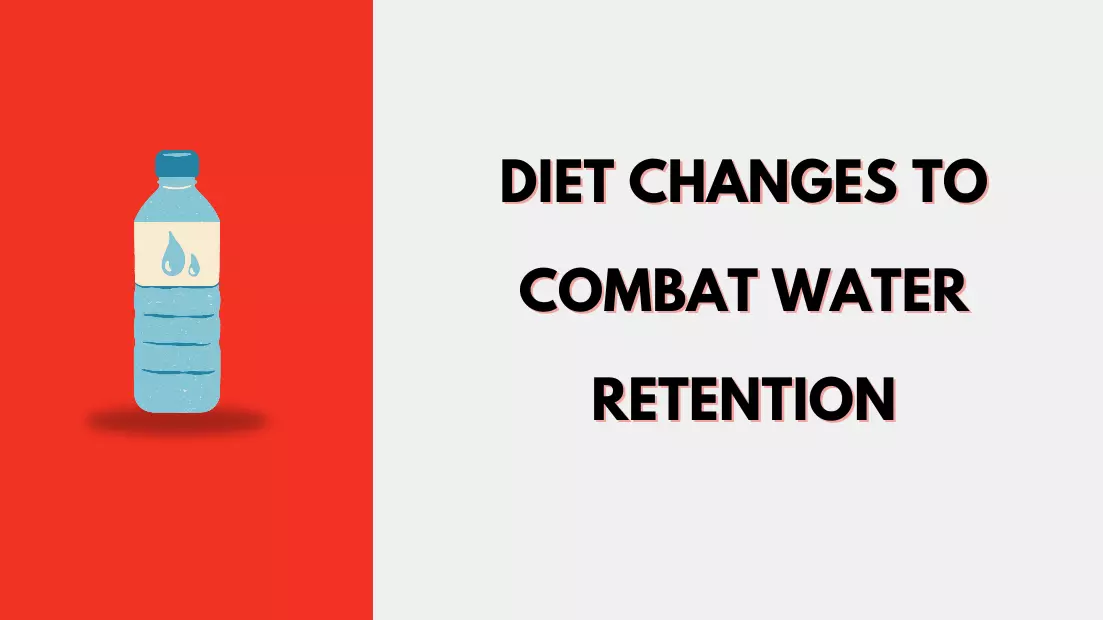
Water retention, also known as edema, is a common condition that occurs when excess fluids build up in the body’s tissues. While mild water retention is normal, chronic or severe cases may signal an underlying health issue. One way to address water retention is through dietary changes. In this article, we’ll explore effective strategies to combat water retention and promote overall well-being.
Understanding Water Retention
Before diving into dietary solutions, it’s crucial to understand what causes water retention. Several factors contribute to this condition, including dehydration, poor diet, sedentary lifestyle, and certain medical conditions like kidney problems or heart failure. Water retention often leads to swelling in the hands, legs, and feet. By addressing the root causes, we can implement dietary changes to alleviate this discomfort.
Hydration: The Key to Balancing Fluids
Proper Hydration: Ensuring adequate hydration is essential to maintain a healthy fluid balance in the body. When the body senses dehydration, it tends to hold on to water, leading to increased retention. Aim to drink at least 8 glasses (64 ounces) of water daily to keep your body hydrated and encourage the flushing out of excess fluids.
Reducing Sodium Intake: Sodium, a key component of table salt, plays a significant role in water retention. High sodium intake can disrupt the balance of fluids in the body, causing it to retain more water. Opt for fresh, whole foods, and limit processed foods high in sodium. Additionally, avoid adding extra salt to your meals, and choose herbs and spices for flavor instead.
Hydrating Foods: Incorporate water-rich foods into your diet, such as cucumbers, watermelon, and celery. These foods not only contribute to your overall hydration but also provide essential nutrients that support a healthy body.
Potassium-Rich Foods for Balance
Importance of Potassium: Potassium is a key electrolyte that helps regulate fluid balance in and out of cells. An imbalance between sodium and potassium levels can contribute to water retention. Include potassium-rich foods like bananas, oranges, spinach, and potatoes in your diet to support proper electrolyte balance.
Banishing Bananas Myth: While bananas are high in potassium, they also contain diuretic compounds that help the body eliminate excess water. Contrary to the misconception that bananas contribute to water retention, they can be a valuable addition to your diet when consumed in moderation.
Diuretic Foods to Flush Excess Fluids
Natural Diuretics: Certain foods possess diuretic properties, promoting the elimination of excess fluids from the body. Include diuretic-rich foods such as asparagus, parsley, and dandelion greens in your meals. These natural options can help reduce water retention by increasing urine production.
Caffeine and its Diuretic Effect: Moderate caffeine intake from sources like coffee and tea can act as a natural diuretic, aiding in the removal of excess water. However, be mindful not to overconsume, as excessive caffeine intake can have adverse effects on health.
Balanced Nutrition for Optimal Health
Protein-Rich Diet: Adequate protein intake is crucial for maintaining muscle health and supporting overall well-being. Protein helps prevent the leakage of fluids from blood vessels into surrounding tissues, reducing the risk of edema. Include lean sources of protein such as chicken, fish, tofu, and legumes in your meals.
Essential Fatty Acids: Incorporate foods rich in omega-3 fatty acids, like salmon and flaxseeds, to combat inflammation. Chronic inflammation can contribute to water retention, and these healthy fats help reduce inflammatory responses in the body.
Mindful Eating and Lifestyle Changes
Slow and Enjoyable Meals: Eating slowly and savoring each bite can aid digestion and prevent overeating. When we eat too quickly, our bodies may struggle to process food efficiently, leading to bloating and water retention. Take the time to enjoy your meals, allowing your body to signal when it’s satisfied.
Regular Physical Activity: Engaging in regular exercise is not only beneficial for overall health but also helps prevent water retention. Physical activity promotes circulation, reducing the likelihood of fluids pooling in the extremities. Aim for at least 30 minutes of moderate exercise most days of the week.
Limiting Alcohol Consumption: Alcohol can contribute to dehydration, prompting the body to retain water. Limit your alcohol intake and balance it with water consumption to mitigate its dehydrating effects.
Monitoring Progress and Seeking Professional Advice
Keep a Food Diary: Tracking your daily food intake can help identify patterns related to water retention. Note the foods that make you feel bloated or swollen and consider adjusting your diet accordingly. A food diary provides valuable insights into your eating habits and their impact on your body.
Consulting a Healthcare Professional: If water retention persists or worsens, it’s crucial to consult with a healthcare professional. Persistent edema could be a symptom of an underlying health condition that requires medical attention. A healthcare provider can conduct tests to determine the root cause and recommend appropriate treatment.
Conclusion
Addressing water retention through dietary changes is a proactive and natural approach to promoting overall health. By focusing on proper hydration, balanced nutrition, and mindful eating, individuals can reduce the discomfort associated with water retention. Remember, the key is to make sustainable lifestyle changes that support long-term well-being. Implementing these dietary strategies, along with a healthy lifestyle, can pave the way for improved fluid balance and a more comfortable, bloat-free life.
Comprehensive List of Products and Services to Alleviate Water Retention
In the quest to manage water retention, various online products and services offer valuable assistance. From nutrient-rich foods to specialized garments, these items can complement your efforts. Here’s a categorized list with rich anchor text for your convenience:
Nutrient-Rich Foods
- Organic Spinach Powder – Packed with essential nutrients, including potassium, spinach powder can contribute to a balanced diet aimed at reducing water retention.
- Hydrating Coconut Water – A natural electrolyte-rich beverage, coconut water supports hydration and helps maintain fluid balance in the body.
Diuretic Supplements
- Dandelion Extract Capsules – Known for their diuretic properties, dandelion extract supplements may aid in promoting urine production and reducing water retention.
- Potassium Supplements – If your diet lacks potassium-rich foods, supplements can be a convenient way to ensure an adequate intake for fluid balance.
- Magnesium Supplements – Magnesium is believed to have diuretic effects, potentially assisting in the management of water retention when taken as a supplement.
Compression Garments
- Compression Socks – Designed to improve circulation in the legs, compression socks can be beneficial for reducing swelling and fluid buildup, especially for those prone to water retention.
- Compression Sleeves – Similar to compression socks, compression sleeves provide targeted support to specific areas, aiding in minimizing fluid retention.
Hydration Monitoring Apps
- Hydrate Now App – Apps like Hydrate Now can help you track your daily water intake, ensuring you stay adequately hydrated and minimize the risk of water retention.
Herbal Teas
- Dandelion Root Tea – Dandelion root tea is known for its diuretic properties and can be a flavorful way to incorporate natural hydration and support fluid balance.
- Nettle Leaf Tea – Nettle leaf tea is believed to have mild diuretic effects, making it a soothing option to include in your daily routine.
Remember to consult with healthcare professionals before incorporating supplements or making significant changes to your diet. These online products and services can complement your overall strategy for combatting water retention, but personalized advice is essential for optimal results.
FAQs
1. How can compression garments help with water retention?
Compression garments, such as socks and sleeves, aid in improving circulation, reducing swelling, and preventing fluid buildup. They apply gentle pressure to the affected areas, helping the body manage water retention more effectively.
2. Are diuretic supplements safe to use for managing water retention?
While diuretic supplements like dandelion extract and potassium supplements can be beneficial, it’s crucial to consult with a healthcare professional before incorporating them into your routine. They can provide personalized advice based on your health status and potential interactions with other medications.
3. Can nutrient-rich foods help reduce water retention?
Yes, incorporating nutrient-rich foods, especially those high in potassium like spinach powder and coconut water, can play a significant role in balancing fluids in the body. These foods contribute to overall health and support the management of water retention.
4. How do hydration monitoring apps work in combating water retention?
Hydration monitoring apps, such as Hydrate Now, help you keep track of your daily water intake. Staying adequately hydrated is essential for managing water retention, and these apps can serve as reminders to ensure you meet your hydration goals.
5. Is it necessary to consult a healthcare professional before using these products and services?
Yes, it’s essential to consult with a healthcare professional before using any supplements or making significant changes to your diet. They can provide personalized guidance based on your medical history, ensuring that the chosen products and services are safe and effective for your specific needs.
6. Can herbal teas like dandelion root and nettle leaf help with water retention?
Herbal teas like dandelion root and nettle leaf are believed to have mild diuretic effects. While they may contribute to reducing water retention, it’s crucial to incorporate them into a well-balanced diet and consult with a healthcare professional for personalized advice.
7. How do compression garments differ from one another?
Compression garments, such as socks and sleeves, vary in terms of compression level, material, and design. The choice depends on individual preferences, the severity of water retention, and specific areas of concern. It’s advisable to choose compression garments that suit your needs after consulting with healthcare professionals.
8. Are there any lifestyle changes that can help prevent water retention?
Yes, adopting a healthy lifestyle can contribute to preventing water retention. This includes regular exercise, maintaining a balanced diet, avoiding excessive sodium intake, and staying hydrated. Small changes in daily habits can have a positive impact on fluid balance in the body.
Remember, these FAQs provide general information, and individual experiences may vary. Always seek professional advice for personalized recommendations based on your unique health situation.



